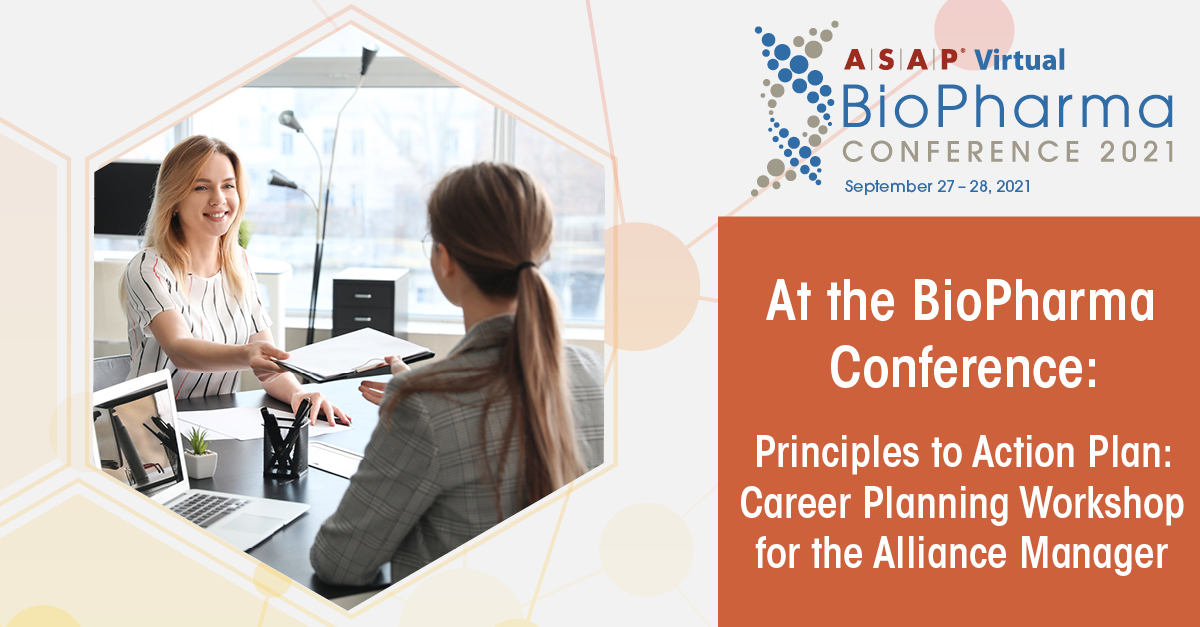You’ve Got to Own It: Your Career Journey and Your “Stakeholder Matrix”
As we wind down toward the end of the year, we’re looking forward and looking backward at the same time. Forward, of course, to 2022, but even before that to the Q4 issue of Strategic Alliance Quarterly, which will be hitting members’ inboxes soon. And backward to the ASAP BioPharma Conference, which concluded in late September.
The reason? One of the conference on-demand sessions was not only extremely valuable in and of itself, but proved to be a nice springboard to a feature in the next issue of the magazine. “Principles to Action Plan: Career Planning Workshop for the Alliance Manager” featured Katherine Kendrick, CSAP, executive director and head of alliance management at Jazz Pharmaceuticals, and Susan Page, head of organization and talent effectiveness at Global Blood Therapeutics. In addition to their on-demand session, the two hosted an interactive, live companion roundtable in which participants discussed their career planning goals, concerns, questions, and challenges.
In the on-demand session, Kendrick and Page spoke of the importance of seeking out and cultivating mentors to help in one’s career journey—including looking for and taking in “critical feedback” and “pointed questions” that are not always easy to hear. Kendrick described helping others with their career planning as part of her own personal “why”—and Page said that Kendrick actually served as one of her “stakeholders” as she took a “sideways path” in her career journey that for a time involved alliance management.
Since then, Page has gone in more of a human resources direction, giving her career planning insights added weight. In her current role she emphasizes maintaining a “growth mindset,” as well as coaching, ongoing feedback, and “the power of giving back.”
The What, the Why, and What’s Next?
Both Kendrick and Page urged understanding yourself—knowing your “what” and your “why”—and factoring in the implications of the Great Resignation as you ponder “what is that next opportunity for me?” as Page put it.
“What gives you energy?” Page continued. “Some people give me funny faces [when I ask that], or they’re not prepared to answer that question. But equally important is what sucks energy out of you.”
In addition, it’s great to have a good manager who is a “steward of your career journey” and prioritizes your development, but Page acknowledged that this doesn’t always happen—at least not automatically. “Ask for that time; you deserve it, so ask for that support,” she urged.
Kendrick recommended forming your own “career planning support team” to help you in your journey. The conversations you have don’t need to be “rigid and formal,” she said. They don’t even have to be with your manager. Simply identify two or more people to be part of this team, including some internal to your company as well as any outside connections you have or can make. From them you may be able to glean industry insights, knowledge about opportunities that are available, as well as possibly some guidance into your own specific situation.
You need someone on this team “who can see your challenges,” Kendrick said. “Who’s your champion? Who can you ask confidential questions? People want to help you. You have these people in your life.”
Page called this process “building your stakeholder matrix.” “Development is owned by you, and it’s shaped by your major stakeholders,” she added. “Do your managers and [others] support your career journey by connecting you with people in their network and evangelizing your worth within the organization?”
Scenario Planning
In the on-demand session, Kendrick discussed career planning in terms of three different scenarios: 1) a promotion to the next level of your current alliance management role, 2) a change of role that involves going into an area adjacent to alliance management (such as finance, business development, people management, etc.), or 3) moving to another alliance management role outside your company, at another organization.
It’s important to be open-minded and take a 360-degree view since, as Page said, “Opportunity is not always there. We should stop talking about career mobility as a ladder, and more as a lattice.” Careers, she added, are actually opportunities to gain experiences—an especially valuable concept in “this world of change.”
“It’s a portfolio we curate rather than a singular path we pursue,” she continued. And, she said, “Don’t be afraid of what you might uncover. ‘What if there isn’t an opportunity?’ Well, don’t you at least want to know that? Whatever you find out is better than not knowing.”
Kendrick stressed that wherever it may ultimately take you, the long and winding road of career development requires time and patience. She urged alliance professionals to know and remember their own career goals, and understand how and why their current company may or may not be fulfilling those goals. Ask your “team” and any connections who made similar transitions what they learned—and what they wish they’d asked before they made the leap. And above all, remember the importance of company culture—“not just the words on their partnering website,” she said, but authentic “network feedback.”
Page ended by noting that the career planning process “is really about how to empower ourselves to achieve great things in our careers. So be confident and know your value, and keep imposter syndrome at bay.”
There were many more great insights in this session—and its companion roundtable—than can be summarized here. Fortunately for ASAP members, our related feature can be found in the Q4 issue of Strategic Alliance Quarterly. Check out “Now Hiring: Biopharma Alliance Managers,” which includes not only more pearls of wisdom from Kendrick and Page, but also illuminating interviews with biopharma veterans Kristin Rosner of Takeda and Lynnelle Pittet from Wave Life Sciences, plus a few tips on making your own career development journey a fantastic ride. Coming soon to an inbox near you!

